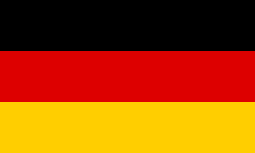Black-Red-Gold
 |
|
| Name | Bundesflagge und Handelsflagge |
|---|---|
| Use |
Civil and state flag, civil ensign |
| Proportion | 3:5 |
| Adopted | 23 May 1949 |
| Design | A horizontal tricolour of black, red, and gold. |

Variant flag of Federal Republic of Germany
|
|
| Name | Bundesdienstflagge und Dienstflagge der Landstreitkräfte der Bundeswehr |
| Use |
State flag and ensign, war flag |
| Proportion | 3:5 |
| Adopted | 7 June 1950 |

Variant flag of Federal Republic of Germany
|
|
| Name | Dienstflagge der Seestreitkräfte der Bundeswehr |
| Use |
Naval ensign |
| Proportion | 3:5 |
| Adopted | 9 May 1956 |
The flag of Germany or German Flag is a tricolour consisting of three equal horizontal bands displaying the national colours of Germany: black, red, and gold. The flag was first adopted as the national flag of modern Germany in 1919, during the short-lived Weimar Republic to 1933.
Germany has two competing traditions of national colours, black-red-gold and black-white-red, which have played an important role in the . The black-red-gold tricolour's first appearance anywhere in a German-ethnicity sovereign state within what today comprises Germany occurred in 1778, and achieved prominence during the 1848 Revolutions. The short-lived Frankfurt Parliament of 1848–1850 proposed the tricolour as a flag for a united and democratic German state under a constitutional monarchy. With the formation of the short-lived Weimar Republic after World War I, the tricolour was adopted as the national flag of Germany. Sixteen years later following World War II, the tricolour was again designated as the flag of both West and East Germany divided states in 1949. The two flags were identical until 1959, when the East German flag was augmented with the coat of arms of East Germany. Since reunification on 3 October 1990, the black-red-gold tricolour has become the flag of a reunified Federal Republic of Germany.
...
Wikipedia
